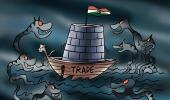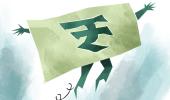The Indian services sector activity fell to a six-month low in September, as new business inflows rose at the slowest rates since March, amid inflationary pressures and competitive conditions, a monthly survey said.

The seasonally adjusted S&P Global India Services PMI Business Activity Index fell to 54.3 in September, from 57.2 in August, highlighting the weakest rate of expansion since March.
For the fourteenth straight month, the services sector witnessed an expansion in output. In Purchasing Managers' Index (PMI) parlance, a print above 50 means expansion, while a score below 50 denotes contraction.
"The Indian service sector has overcome many adversities in recent months, with the latest PMI data continuing to show a strong performance despite some loss of growth momentum in September," said Pollyanna De Lima, Economics Associate director at S&P Global Market Intelligence.
The upturn was reportedly restricted by price pressures, an increasingly competitive environment and unfavourable public policies, the survey said.
Lima further noted that the steep depreciation of the rupee seen towards the end of the month due to interest rate hikes in the US present additional challenges to the Indian economy.
"Currency instability poses renewed inflation worries as imported items become more costly, and undoubtedly means that the RBI will continue hiking interest rates to protect the rupee and contain price pressures," Lima said.
On September 30, the monetary policy committee (MPC) of the Reserve Bank of India (RBI) raised the key lending rate or the repo rate to 5.90 per cent - the highest since April 2019.
The MPC also decided to remain focused on the withdrawal of the accommodative policy stance to ensure that inflation remains within the target going forward, while supporting growth, RBI Governor Shaktikanta Das said.
According to Lima, an upturn in inflation could damage consumer spending, dampen business confidence and test the resilience of the Indian service sector in the coming months but, at least for September, service providers were strongly upbeat towards growth prospects.
The survey further noted that weak external demand weighed on overall sales, with international orders declining further in September.
Monthly contractions have been recorded in each month since the onset of COVID-19.
The data highlighted a continued revival in business confidence, with sentiment at its highest level in over seven-and-a-half years.
Service providers signalled a further increase in their operating expenses during September, owing to higher energy, food, labour and material costs.
On the employment front, though capacity pressures moderated in September, efforts to clear pending workloads and ongoing expansions in sales supported another round of job creation.
However, employment rose at a slower rate than in August, the survey said.
Meanwhile, the S&P Global India Composite PMI Output Index -- which measures combined services and manufacturing output -- slipped from 58.2 in August to 55.1 in September, pointing to the weakest rate of expansion since March.
Private sector sales rose at the weakest pace in six months, amid softer increases in the manufacturing and services economies.
The S&P Global India Services PMI® is compiled by S&P Global from responses to questionnaires sent to a panel of around 400 service sector companies.
The panel is stratified by detailed sector and company workforce size, based on contributions to GDP. Data collection began in December 2005.











 © 2025
© 2025